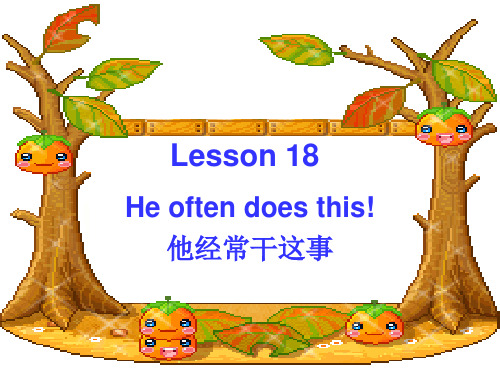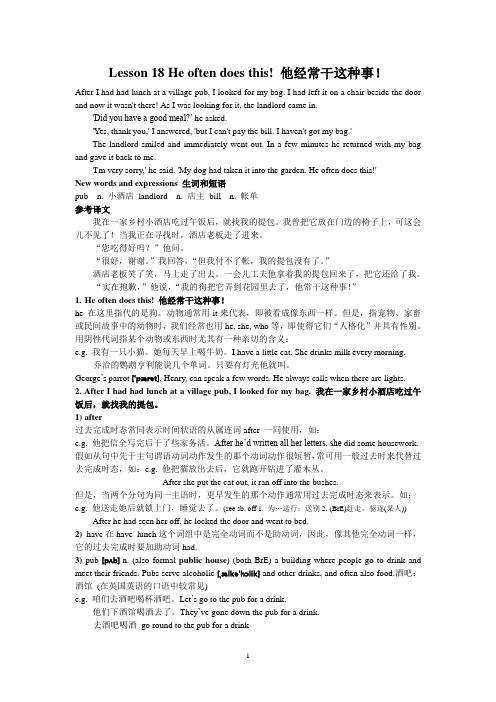新概念英语-第二册第18课
新概念英语2第18课 NCE2_Lesson18

• 7、'I'm very sorry,' he said.
'My dog had taken in into the
garden. He often does this!'
钱
• 3 He had to leave early. ⑶...换... • 4 We have had a long conversation. ⑷...不换...
进行
• 5 My mother has a headache. ⑸...换... 患病 • 6 They had a good time at the party. ⑹...不换... • have a good/long time : 过的愉快(固定短语)
其他事要做。
Summary
New words :
pub [pʌb] n. 小酒店
landlord ['lændlɔ:d]n. 店主,地主 bill [bil] n. 账单,比尔
He 指宠物、she 山川、湖泊、国家、建筑
Have 三种常见用法 As….. , …. 正当…的时候,…发生了
Look for 寻找
Special difficulties
give的几个固定搭配
1.give常用含义是“给予,交给” I lent him some books last month and he has given them back
to me this morning. 2.gave away 赠送 • He gave away all his books to the library. 3.give in 上交,呈交;屈服,让步,投降 • Give in your examination papers after you’ve finished. • You can do what you like. I will never give in. 4.give up doing sth. 放弃,抛弃 • He gave up drinking a few years ago. 5.give up 交出,让出 • Jack has given up the watch he stole last week. • Three of our officers gave themselves up to the enemy. 我
新概念英语第二册第18课

Lesson 18 He often does this! 他经常干这种事!After I had had lunch at a village pub, I looked for my bag. I had left it on a chair beside the door and now it wasn't there! As I was looking for it, the landlord came in.'Did you have a good meal?’ he asked.'Yes, thank you,' I answered, 'but I can't pay the bill. I haven't got my bag.'The landlord smiled and immediately went out. In a few minutes he returned with my bag and gave it back to me.'I'm very sorry,' he said. 'My dog had taken it into the garden. He often does this!'New words and expressions 生词和短语pub n. 小酒店landlord n. 店主bill n. 帐单参考译文我在一家乡村小酒店吃过午饭后,就找我的提包。
我曾把它放在门边的椅子上,可这会儿不见了!当我正在寻找时,酒店老板走了进来。
“您吃得好吗?”他问。
“很好,谢谢。
”我回答,“但我付不了帐,我的提包没有了。
”酒店老板笑了笑,马上走了出去。
一会儿工夫他拿着我的提包回来了,把它还给了我。
“实在抱歉,”他说,“我的狗把它弄到花园里去了,他常干这种事!”1.He often does this! 他经常干这种事!he 在这里指代的是狗。
新概念英语第二册Lesson18

Lesson 18 He often does this! 他经常干这种事! First listen and then answer the question. What had happened to the writer's bag? After I had had lunch at a village pub, I looked for my bag. I had left it on a chair beside the door and now it wasn't there! As I was looking for it, the landlord came in. 'Did you have a good meal?" he asked. 'Yes, thank you,' I answered, 'but I can't pay the bill. I haven't got my bag.' The landlord smiled and immediately went out. In a few minutes he returned with my bag and gave it back to me. 'I'm very sorry,' he said. 'My dog had taken it into the garden. He often does this!'
新概念第二册Lesson 18 He often does this

2、I had left it on a chair beside the door and now it wasn't there?
→e.g.: He left a note on the door .
→e.g.: I think I must have left the key in the room. beside/ besides/ except beside 在...旁边 beside the door/ window / car /lake besides (除了...外包括)包括... He can speak many languages besides English except 除了... Every student came to the party except Tom.
3、What had happened to your handbag?
Questions on the text
1、Where did you leave her handbag? She left her handbag on the chair beside the door. 2、Why couldn't you pay the bill ?
look for
&
find
→I was looking for the map for half an hour and finnally I found it. look for find 找的动作 找的结果
Yesterday I was my lost keys, but I have not them now.
Let’s play a guessing game.(animal) 1.It runs very fast, people used it as a traffic tool In the old days.
新概念英语第二册学生用书Lesson18

常干这这种事!Lesson 18 He often does this! 他经常干First listen and then answer the question.听录音,然后回答以下问题。
What had happened to the writer's bag?After I had had lunch at a village pub, I looked for my bag. I had left it on a chair beside the door and now it wasn't there! As I was looking for it, the landlord came in.‘Did you have a good meal?’he asked.‘Yes, thank you, ’I answered, ‘but I can't pay the bill . I haven't got my bag. ’The landlord smiled and immediately went out. In a few minutes he returned with my bag and gave it back to me.‘I'm very sorry, ’he said. ‘My dog had taken it into the garden. He often doesthis!’和短语语New words and expressions 生词和短pub(1. 1)/p)b/n. 小酒店bill(1. 5)/bil/n. 帐单landlord(1. 3)/'l$ndl&:d/n. 店主文注释释Notes on the text 课文注1 pay the bill, 付帐。
2 He often does this. 他经常干这种事。
新概念英语第二册学生用书Lesson18

常干这这种事!Lesson 18 He often does this! 他经常干First listen and then answer the question.听录音,然后回答以下问题。
What had happened to the writer's bag?After I had had lunch at a village pub, I looked for my bag. I had left it on a chair beside the door and now it wasn't there! As I was looking for it, the landlord came in.‘Did you have a good meal?’he asked.‘Yes, thank you, ’I answered, ‘but I can't pay the bill . I haven't got my bag. ’The landlord smiled and immediately went out. In a few minutes he returned with my bag and gave it back to me.‘I'm very sorry, ’he said. ‘My dog had taken it into the garden. He often doesthis!’和短语语New words and expressions 生词和短pub(1. 1)/p)b/n. 小酒店bill(1. 5)/bil/n. 帐单landlord(1. 3)/'l$ndl&:d/n. 店主文注释释Notes on the text 课文注1 pay the bill, 付帐。
2 He often does this. 他经常干这种事。
新概念英语第二册lesson18精品PPT课件
住客栈
2 landlord
(1)主人, 房东(旅馆,家庭,公寓)
(2)地主
lord n . 统治者,主人,贵族,勋爵
Lord! 天啊!哎呀!哎哟! as drunk as a lord 酩酊大醉
landlady 女主人;
3 Bill 1) n. 账单,纸币 (note)
2) n. 招贴,广告,海报
1) n. 账单,纸币 (note) pay the bill/settle the bill
付账
It’s wrong to leave a hotel without paying all your bills. 没有付账离开旅馆是不对的。
新概念英语第二册第18课(revise)
(4) at a village pub
I like village pubs.
(5) look for(寻找)
我正在找我的铅笔。 I am looking for my pencil.
Wonderful sentences
2.I had left it on a chair beside the door and now it wasn’t there. 精彩点: (1)had left (2)leave something on …(把…遗忘在…)
McDonald’ s Menu
Wonderful sentences
5.In a few minutes he returned with my bag and give it back to me . 精彩点: (1)in a few minutes(一会儿以后) (2)returned with (带着…回来)
这个小女孩站在大门口。
The girl stand beside the door.
Wonderful sentences
3.As I was looking for it ,the landlord came in. 精彩点: (1)过去进行时的完美使用 (2)as somebody was v-ing…,something happened 当我在唱歌时,他进来了。 When I was singing , he came in. 当我正上课时,外面下起了暴雨。 When I was having the class, the heavy rain began.
P25.P65
现在完成时 Have、has + 过去分词
新概念英语第二册:第18课课文详解及语法解析
新概念英语第二册:第18课课文详解及语法解析课文详注 Further notes on the text1.After I had had lunch at a village pub, I looked for my bag.我在一家乡村小酒店吃过午饭后,就找我的提包。
(1)have在have lunch这个词组中是完全动词而不是助动词,所以,像其他完全动词一样,它的过去完成时要加助动词had。
(cf. 本课语法)(2)pub为public house(酒店,酒吧)的缩略形式,在英国英语的口语中较常见:Let's go to the pub for a drink.咱们去酒店喝杯酒吧。
(3)look for强调“寻找”这个动作,而不涉及结果:I looked for my key everywhere, but I couldn't find it.我到处寻找我的钥匙,但还是没找到。
2.I had left it on a chair beside the doo r…我曾把它放在门边的椅子上……leave除了“离去”、“离开”、“出发”的意思,还能够表示“把(人、物)留下”、“遗留”、“丢下”等:The dog has left your bag by a tree.那狗把你的提包丢在了一棵树旁。
Have you left anything in the car?你有没有把什么东西丢在车里?Leave the books on the desk.把书放在课桌上。
3.My dog had taken it into the garden. He often doesthis!我的狗把它弄到花园里去了,他常干这种事!he在这里指代的是狗。
动物通常用it来代表,即被看成像东西一样。
但是,指宠物、家畜或民间故事中的动物时,我们经常也用he,she,who等,即使得它们“人格化”并具有性别。
新概念英语第二册第18课
Lesson 18 He often does this他经常干这种事!【New words and expressions】1 pub [pʌb] n.小酒店2 landlord ['lændlɔ:d] n.店主3 bill [bil] n.帐单一、单词讲解pub(口语)大众酒吧,酒馆public house 酒馆、bar 酒吧landlord主人,老板,房东(旅馆,家庭,公寓)landlady 女房东,女主人bill1) n. 账单,纸币(note)pay the bill/settle the bill 付账eg. Bill, please! 买单!2) n. 广告,海报*a movie bill 电影海报eg. No bills! 禁止张贴!fit the bill/fill the bill 合乎要求head the bill/top the bill 领衔主演,挂头牌二、关键句型Key Structureshave的用法:l、现在完成时have/has + V. -ed'1)表示过去某时发生的某一动作对现在造成的影响或结果。
2)表示动作从过去已经开始,持续到现在,并且还可能继续下去的动作或状态。
2、过去完成时:had + V. -ed1)表示在过去某一时刻或动作以前已经完成了的动作,即“过去的过去”2)表示由过去的某一时刻开始,一直延续到过去另一时刻的动作或状态。
例:Have you had lunch yet 你吃过午饭了么He and I have known each other for a long time.他和我已经认识很久了。
~After he had finished work he went home他完成工作后回家了。
We had been waitiing for an hour when he showed up.他出现时,我们己经等了一个小时了。
- 1、下载文档前请自行甄别文档内容的完整性,平台不提供额外的编辑、内容补充、找答案等附加服务。
- 2、"仅部分预览"的文档,不可在线预览部分如存在完整性等问题,可反馈申请退款(可完整预览的文档不适用该条件!)。
- 3、如文档侵犯您的权益,请联系客服反馈,我们会尽快为您处理(人工客服工作时间:9:00-18:30)。
had +过去分词
表示过去的时间或动作之前发生的动作,先发生的动作用过去完成时,后发生 的动作用一般过去时。
After he had finished his work, he went out.
过去分词的构成:
become-became-become
3) ABB 4) ABC
sit-sat-sat say-said-said sing-sang-sung
drink-drank-drunk
take-took-taken
构成:助动词had + 动词的过去 分词(V.pp)
在强调过去某一个动作发生在另一个动作前常常用 过去完成时态。
1. 规则动词的变化:
a) 一般情况下在动词后面加 ed work ------ worked play -------- played
b) 以 e 结尾的动词直接加 d
use ------ used
refuse ------ refused
c) 以辅音字母加 y 结尾的动词,把 y 改 i 再加 ed
2. 过去完成时词可以表示过去某一 时刻之前发生的动作或呈现的状态 ,这一动作一直持续 或将继续下去 。
1. 到了六点钟为止,他们已经工作了八小时了。
By six o’clock theyh_a_d_w__o_rk_e_d____ (work)for eight hours.
2. 我到广州时,他在那里很长时间了。
When I came to GZ , he h_a_d__b_e_e_n______(be) there for a long time.
1.他说他以前见过你。
He said that he ___h_a_d__s_e_e_n____ (see) you before.
2. 到六点钟为止他们已经工作八小时了。
By six o’clock they ______________(work) for
eight hours.
had worked
现在完成时:have/has +过去分词
①表示过去某时发生的某一动作对现在造成的影响或结果。 I have finished reading the book .我已经读完这本书了。 I have had supper . Have you had supper ? ② 表示动作从过去已经开始持续到现在,并且还有可能继续
5、“很好,谢谢。”我回答,“但我付不了帐,我的提包没有 了。
'Yes, thank you,' I answered, 'but I can't pay the bill. I haven't got my bag.'
6、酒店老板笑了笑,马上走了出去。 The landlord smiled and immediately went out.
• landlord 店主
1、Where did the writer leave her handbag?
On a chair beside the door.
2、Why couldn’t she pay the bill?
Because her bag wasn’t there.
3、What had happened to her handbag?
study ----- studied carry ----- carried
d) 以重读闭音节结尾的,前面有单个元音字母时 ,双写辅音字母,再加 ed
stop ---- stopped drop ------- dropped
过去分词的构成:
2. 不规则动词的变化
1) AAA 2) ABA
put-put-put read-read-read come-came-come run-ran-run
kangaroo
I have a very long neck and legs.I can eat the leaves on top of the tree.
giraffe
Lesson18 He often does this
lord
village pub 乡村小酒店
• bill
①账单、纸币 • pay the bill =settle the bill 付账
新概念英语-第二册第18 课
2020/9/21
Let’s play a guessiห้องสมุดไป่ตู้g game (animals)
• They like eating bamboos, the color of them are black and white.
panda
• They are the symbols of Australia , and they usually put their babies in front of the pocket.
7、一会儿工夫他拿着我的提包回来了,把它还给了我。
In a few minutes he returned with my bag and gave it back to me.
8、“实在抱歉,”他说,“我的狗把它弄到花园里去了, 他常干这种事!”
'I'm very sorry,' he said. 'My dog had taken in into the garden. He often does this!'
The dog had taken it into the garden.
1、我在一家乡村小酒店吃过午饭后,就找我的提包 。
After I had had lunch at a village pub, I looked for my bag.
2、我曾把它放在门边的椅子上,可这会儿不见了!
I had left it on a chair beside the door and now it wasn't there! 3、当我正在寻找时,酒店老板走了进来。
As I was looking for it, the landlord came in.
4、“您吃得好吗?”他问。 'Did you have a good meal?" he asked.
